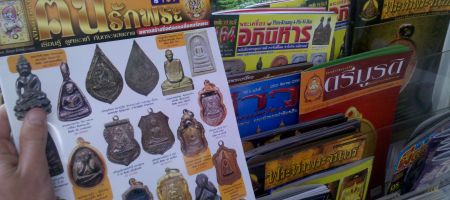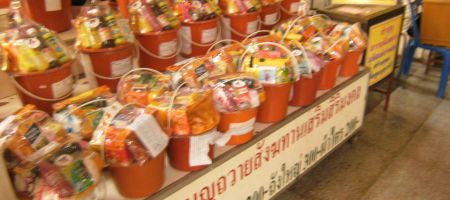Big Business
Part I: My spirits fancy straws
Part II: Big Business
Part III: Thai Religion
The belief in spirits is not the only thing carried over from archaic religions. Particularly often near or sometimes even inside Buddhist monasteries, there are amulet markets where various talismans and other lucky charms are being sold. Many of these talismans are Buddha figurines, but also tiny framed pictures of famous monks are popular.
If a talisman is blessed by a monk, it increases its value somewhat depending on the status of the monk who blessed it. All with proper certificates of course.

I took this picture in a 7-Eleven supermarket, those supermarkets are around every corner. The trade with talismans is so big, there are even magazines about it. There is a whole science connected with talismans which is not just about the value and the effect it is said to have but also there are delicate rules how you treat the talismans, otherwise they could loose their power.
But monks do not only earn money by blessing amulets, whole cars can be blessed as well to protect them from accidents. 1
On the topic of Thai spirit houses, the Wikipedia (currently) has to say that this is an animist belief that is tolerated nowadays by Buddhism in Thailand. But what I saw so far, it is not tolerated at all. No, it is part of the religion and in Thailand even though it is not a Buddhist thing, the Buddhist monks actively participate in it.
Good money, as well. And on the topic of amulets, I claim that they almost run the thing.
And all this business is kinda problematic because actually, monks may not have or use any money.2 Something the Thais are very particular about. Recently there had been scandals of high-ranked monks being accused to disrespect that law, one was accused to own an airplane and several houses in the USA.
Instead of giving money, there is the practice of giving food and everyday items to the monks. Buddhist monks do not beg, people give them food and all the other things they need in order to improve their own karma. This is common in Buddhism. As Thailand is a modern capitalist country, this kinda got streamlined into the product of those “orange buckets”, in cities at least.
These orange buckets are conveniently pre-packaged offerings that contain everyday products for monks. Depending on the “brand”, sometimes included are also things like flashlights and other non-disposable stuff where I start asking myself how many flashlights they might (have to) “consume” per day. They can be bought in many convenience stores, supermarkets and, interestingly, sometimes right in front of the temple on monastery premises.
Rumor has it, that they don’t open many of the buckets anymore but sell them back to the shops to buy something more useful (like rice, maintenance costs for the buildings etc.). It is only a rumor because Buddhist monasteries plus money is kind of a taboo even though everyone (should) know it is hard to do without.
1 A practice though that can’t be said to be unique in Thai culture (scroll down).
2 Buddhist monks should not use any money because enjoying luxury or involving yourself in any kind of trade distracts you from the path to enlightenment. Christian monks should not have any money because it makes you corrupt.

